Shashi Bhat Cried When She Got the Last Line Right
Writing = Making and Solving Problems, Try This at Home, Let's Help a Writer for Free!
Hi Friends,
Thanks so much for the notes of support about my dad’s cancer diagnosis (and the tenure congratulations) in response to my last post. Even seeing your names in the little heart box gave me a feeling of connection across the distance, which means so much right now.
Today, I’m so pleased to share a conversation with my friend Shashi Bhat that gets into writing as making and solving problems at a granular sentence level. I am such a nerd for this kind of close attention! I loved getting this inside peek into Shashi’s revision process and I know you will too.
Writing = Making and Solving Problems
Over time, I’ve come to realize that problems aren’t an impediment to writing. Problems are the substance of writing: we set problems for ourselves and we work them out. In this feature, I ask writers to dig into a specific writing problem and how they resolved it.
Shashi’s short story collection Death By a Thousand Cuts was published at the end of April. These stories made me laugh at Reddit rabbit holes, dating app profiles, and therapist conversations only to abruptly leave me feeling like I’d just got a paper cut: a subtle slip I barely noticed, then blood, then a searing sting.

I bought the book at an Incite event and finished it within twenty-four hours (skipping my morning gym plan because sitting up in bed with coffee and the last few stories was just too compelling). It’s always fascinating to read fiction by someone I know personally. I see them and not-them brought together, hear their voice and humor and sometimes recognize moments or details from past conversations, but also get a thrill from their leaps of inventions, the voices, decisions, and revelations that feel deeply unlike the person I know.
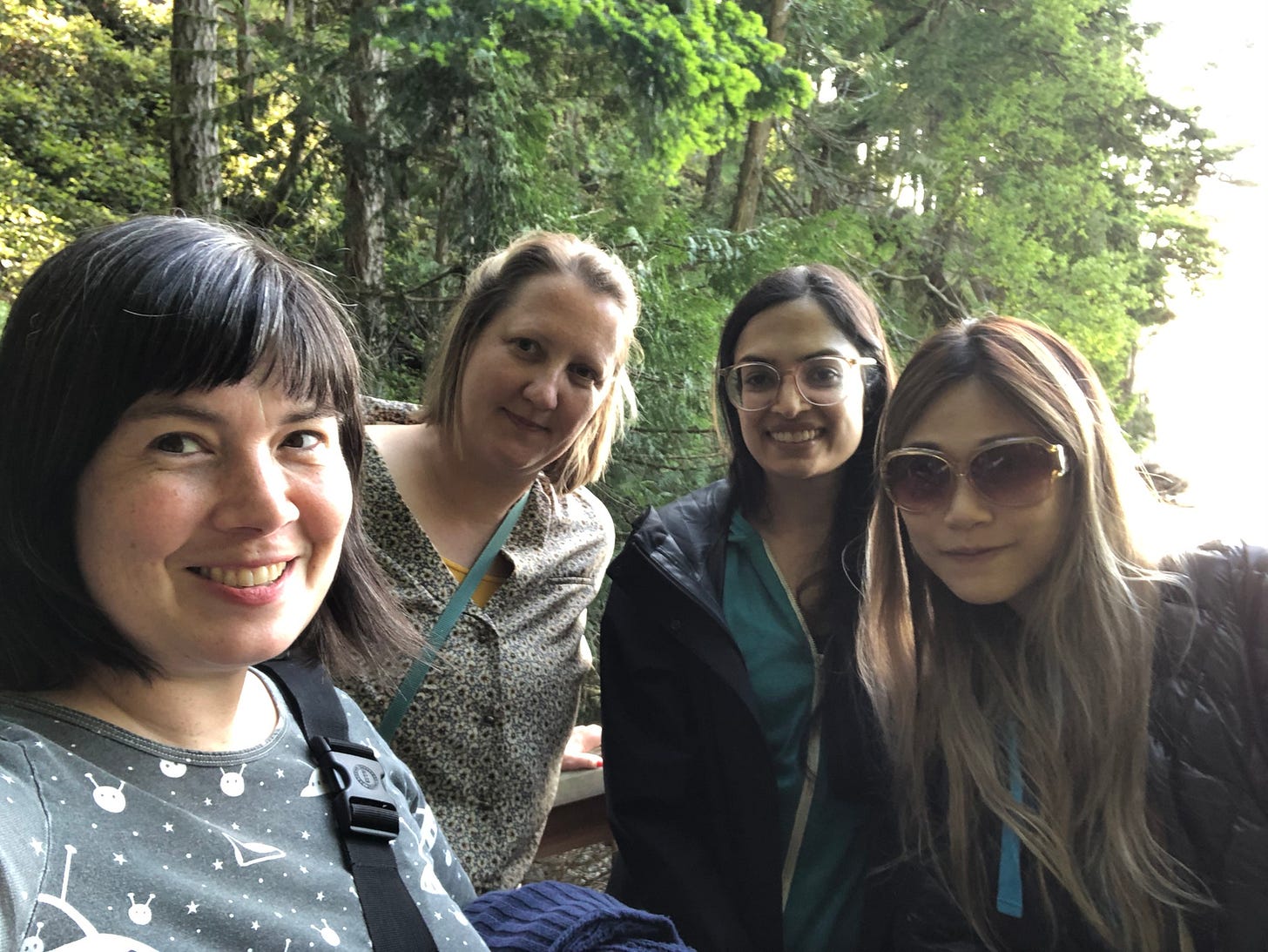
I met Shashi (I think through Lindsay Wong, who is an amazing writer-connector) not too long after moving to Vancouver, and having a flexible standing Friday afternoon write-on-site meet-up with Shashi,
, and a rotating group of others has been such an anchoring and nourishing part of making Vancouver feel like home after a pretty isolating beginning (moving to start a new job in August 2020 was rough!).Over Friday meet-ups, Shashi talked about editing this collection down to its current size, choosing only the most fully-realized stories. It shows! This book is all bangers. And when you see the care and intention Shashi brings to each word, you’ll get why.
What are three key things to know about this book?
It’s a short story collection about the painful absurdities and everyday indignities that come with being a woman.
With the title, I wanted to suggest the theme of accumulating injustices, small slices of harm that are ultimately devastating—this theme is present in some way in every story in this book. I didn’t know it was also the name of a Taylor Swift song.
I was aiming for a style that is a mix of funny and poignant, where a story’s dark honesty sometimes hits you without warning.
What’s a problem—small or large—that you encountered while making this book?
My favourite aspect of the short story form is the ending—how a writer can carefully calibrate an ending to create the feeling of a gut punch or a lump in the throat or an awakening. It disappoints me when I read a short story and its ending misses that opportunity.
With the ending of one of my stories, “Her Ex Writes a Novel,” it took some effort to find an ending that landed the way I wanted it to. The issue was not with plot or image—I had those down. It was wording.
Here’s some context: The story is about a woman who discovers that her ex-boyfriend from a decade earlier has written and published a novel about their breakup. The narrative goes into the history of their toxic relationship, as the woman wrestles with what—if anything—she should do. Should she read the book?
There’s a reference to Stravinsky’s The Firebird earlier in the story, and I brought the piece back in the ending. Here’s the version of the second-to-last paragraph from the original manuscript I sent my editor. The story had been through several revisions at this point.
There’s another book, on a tall shelf in the library of a different, distant city. On the cover, a woman’s back faces the reader as she enters the clearing of a dark forest, aware of the smoke and smell of burning paper behind her. The trees are so twisted they seem to move. There’s something Russian about the design—the stage dressing of a ballet come to life. A laptop becomes a chair and flies across the scene, but before it hits and shatters a lamp, it transforms into a bird, not a phoenix, but still, more flame than wing, more rage than song, a source of light—she slouches towards it, the Firebird, recognizing those notes that seem to sink and rise at the same time, and then the immortal, radiant, stunning sound…
It actually had those ellipses! Yikes. There are two more sentences after this paragraph (I left them out to keep from spoiling the ending), but what I was wrestling with was that very last phrase. It wasn’t doing what I wanted it to. I wanted a feeling of triumph. Instead, it was just trailing off.
What did you do? How did you move forward?
In the next version I sent my editor, I broke up that last long sentence, but the wording was otherwise the same.
She slouches towards it, the Firebird, recognizing those notes that seem to sink and rise at the same time, and then the immortal, radiant, stunning sound.
I knew the line wasn’t quite clicking, and my editor suggested I keep pushing, to clarify the resonance. I went through maybe a dozen different versions of the line, playing around with adjectives.
She slouches towards it, the Firebird, recognizing those notes that seem to sink and rise at the same time, and then the radiant, determined, exultant, stunning sound.
You can see that I was spinning my wheels here. I knew the emotion and impact I wanted the line to have, but I was struggling to pinpoint the wording that would translate that exact feeling to the reader. My editor commented that I was “circling it, accumulating adjectives, rather than getting to the core of it.” (She also said, “You can nail this!” which I found encouraging.)
So here’s what I did:
I went for a long walk on the waterfront near where I live, and where there are often interesting birds like crows and herons (no firebirds, but that was the best I could do). Going on walks tends to get my mind moving, and it’s what I usually do when I’m puzzling over a creative problem. I listened to the Stravinsky piece as I walked, and in my head I played around with the wording.
I also listened to an insightful podcast episode about the piece from the Music Listening Project. The hosts’ passionate analysis had been useful in other parts of my story where I described The Firebird as well, for understanding the piece’s narrative and musical technique. It mattered to me to do justice to not just my character’s emotions but to Stravinsky’s work—it’s such an exquisite piece. I didn’t want to describe it with just some flabby line.
Finally, after all that, I decided to lose some of the adjectives and try a different approach. So much of that process stuff—walking, listening, researching, receiving feedback—is done to trigger instinct and intuition. What materialized was this:
She slouches towards it, the Firebird, drawn by those notes that seem to sink and rise at the same time, and then the stunning, radiant sound of a creature singing as though it had never been harmed.
I felt like this was the right line. To me, the crucial part of the wording is “as though,” because it suggests survival. I cried when I came up with this line (embarrassing but true). I tend to feel it very deeply when wording accurately captures emotion. In my opinion, what makes a good short story ending are inevitability, emotional complexity, and impact. I felt that by changing this one phrase, I had strengthened all three of these aspects.
Still, I was worried that my editor wouldn’t think it was right. I sent her the manuscript and when she responded, she had written in the margins YESSSSSSS!
I would call this one of the most fulfilling moments of my writing life. At that point, I knew for sure the story was finished.
Shashi Bhat is the author of the story collection Death by a Thousand Cuts (McClelland & Stewart), and the novels The Most Precious Substance on Earth (M&S, Grand Central), a finalist for the 2022 Governor General's Award for fiction, and The Family Took Shape (Cormorant), a finalist for the Thomas Raddall Atlantic Fiction Award. Her fiction has won the Writers’ Trust/McClelland & Stewart Journey Prize and been shortlisted for a National Magazine Award and the RBC Bronwen Wallace Award and has appeared in publications across North America. Shashi is the editor of EVENT magazine and teaches creative writing at Douglas College.
Try This at Home
If you notice an adjective pile-up when you’re trying to grasp something important—as when Shashi’s editor told her she was “circling it, accumulating adjectives, rather than getting to the core of it”—shift your attention to other parts of speech: nouns, verbs, even conjunctions or articles.
Take a walk about it. You might even do what Shashi describes here: pick a specific line to work and rework in your head while in motion.
Find readers who will push you by believing in your ability. I love that the editor’s “not there yet” included the note “You can nail this!” The most valuable readers are people who give honest feedback and fill us with confidence that we can do the work. May we be them, may we find them, may we treasure them when we do!
Trust your own inner voice that says “that’s not it, not yet.” While it can feel discouraging in the moment, the fact that we can feel this sense of “no, not yet” is actually great. It means there is an “it” to grasp and that we’ll feel it in our bodies when we reach it. And, yeah, we might cry.
Let’s Help a Writer for Free
If someone texts me to tell me they think I’d like a book, I will probably track that book down sooner or later. Personalized recommendations (via phone, text, note, etc.) are a great way to support a writer. I feel like Shashi’s work is pretty well known in Canada (her last book before this was a finalist for the Governor General’s Award, which is a big deal!), but I’ve got some US friends I think would dig her fiction who may not have read her before.
I sent a text to a poet friend I know is interested in Canadian lit and feminist writing who reads A LOT:
And I sent a text to a short story writer who loves complex characters, moral ambiguity, and skillful structure work.
(Ahem, feel free to identify yourselves in the comments if you want to, friends).
Text a friend to recommend a book! If you want, let me know in the comments what book you recommended to whom and why. I will clap!
More Like This
Kate Schapira Wanted to Write Deep and Straight and Fast Like a Tidal Channel
Hi Friends, I’m back in Vancouver and resuming my summer schedule protocols. These include things like: Start each workday with one hour of non-goal-driven generative writing or just existing without inputs. While eating lunch, reading ok, but not computer open.
Warm best,
Bronwen
PS: If you liked this post, please hit the heart to let me know! You can also support this newsletter by subscribing, sharing, or commenting.

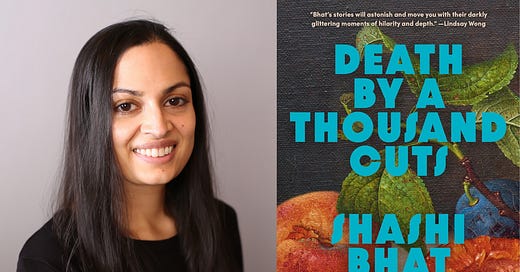

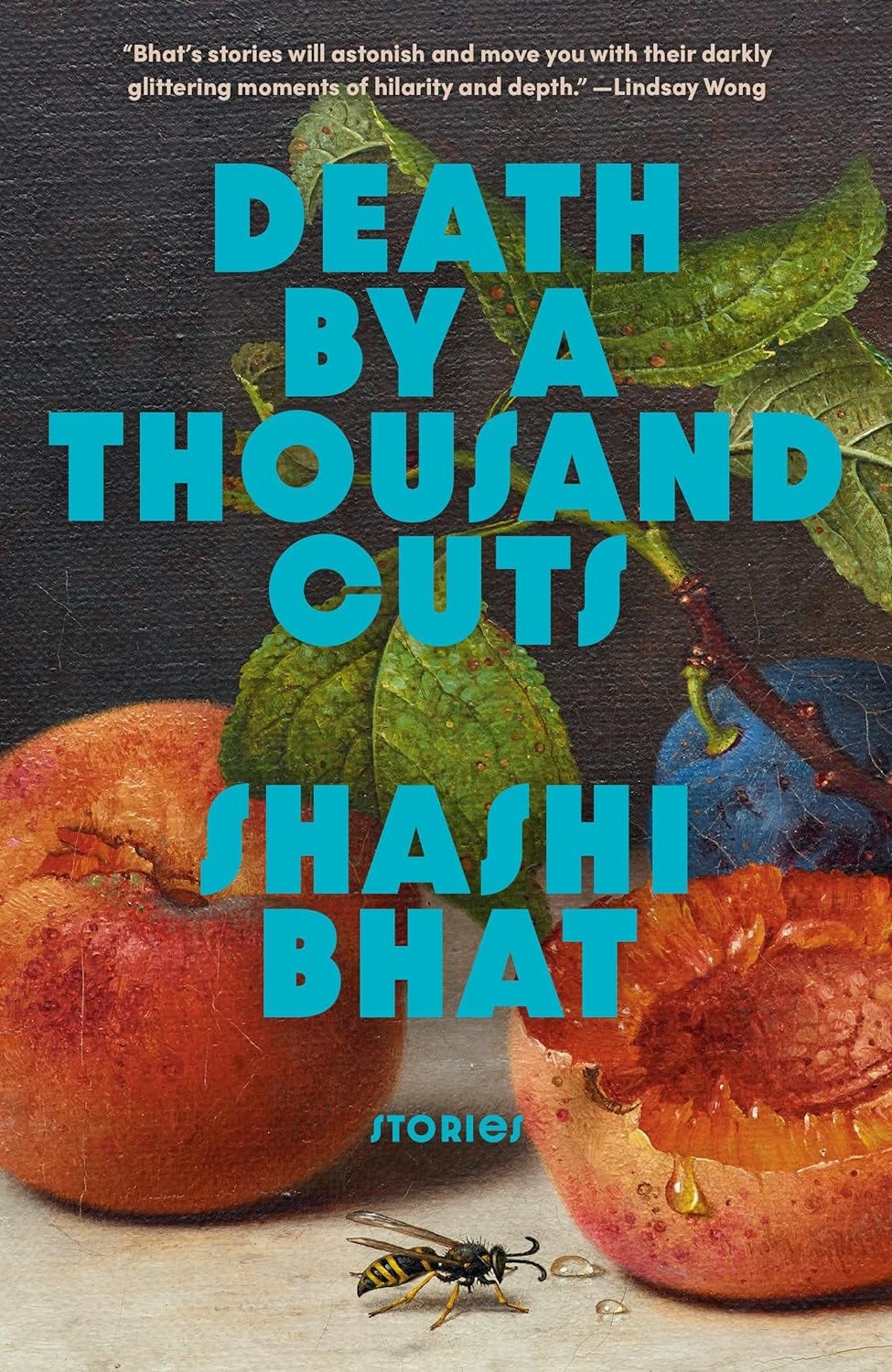

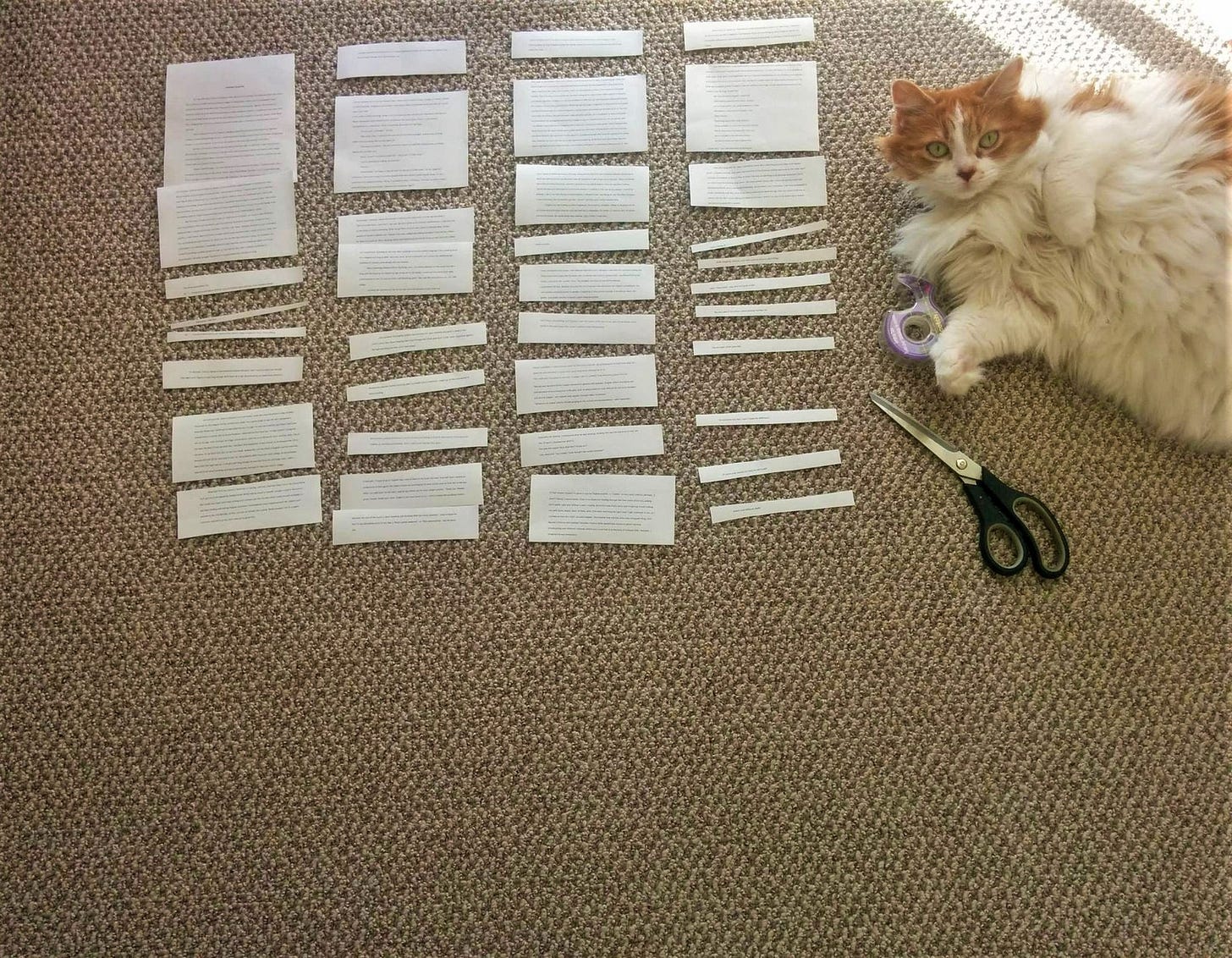

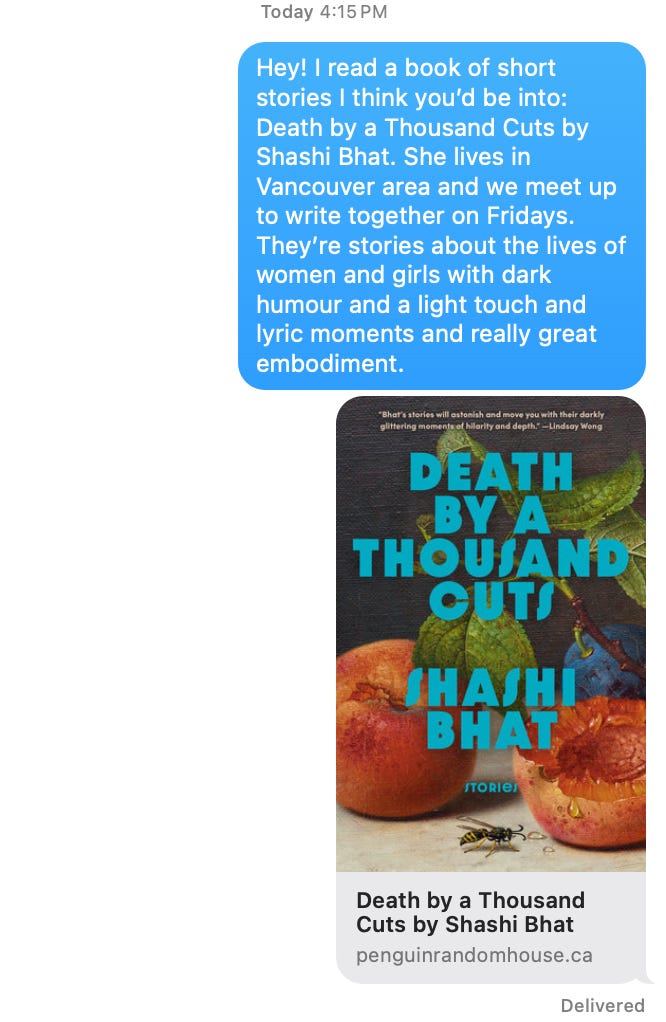


I LOVE a story about process, but especially the story of a single sentence. Thanks, Bronwen and Shashi! So good.
Shashi, it takes generosity to share your process. Thank you for that. Your line gave me a sudden burn in the heart--the one that always flares-up whenever something strikes me as deeply true.